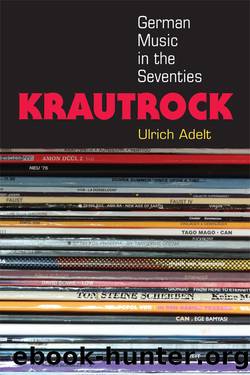Krautrock: German Music in the Seventies by Ulrich Adelt

Author:Ulrich Adelt [Adelt, Ulrich]
Language: eng
Format: epub
Publisher: University of Michigan
In this case we will probably have one of the last feature films with authentic natives in it. They are fading away very quickly and it’s a catastrophe and a tragedy. We are losing [ . . . ] cultures and individualities and languages and mythologies and [ . . . ] we’ll end up like all the cities in the world now with skyscrapers and a universal kind of culture like the American culture.20
Not only did Herzog invoke the tired disappearing-Indian trope and simultaneously espouse a simplified view of both the Aguaruna Indians and a globalized America, he also completely ignored that his own film was really about an Irish businessman played by a white German actor, not about indigenous populations.
As for Aguirre, the camera work and the soundtrack provided more depth to Fitzcarraldo’s somewhat narrow neocolonialist narrative. In addition to four tracks from Popol Vuh’s 1981 release Sei still wisse ICH BIN and jungle soundscapes, as well as silences revived from Aguirre, the film contrasted “civilized” European romantic music (including two on-screen opera performances21) with the “uncivilized” native drums and chanting. Key scenes showed Fitzgerald exposing indigenous children to the music of Italian tenor Enrico Caruso and later on his ship responding to Indian war drums by blasting Caruso from his gramophone. Seemingly setting up a colonialist discourse, these scenes had ironic elements to them, since Fitzgerald as the harbinger of “civilization” is clearly a madman who is equally attracted by the ecstasy of the jungle as by the ecstasy of Caruso’s voice. In addition, Popol Vuh’s songs were situated somewhere between European romanticism and the indigenous music of the film. The main theme “Wehe Khorazim” (“Woe to Chorazin”) about a cursed city in the New Testament featured a chant by the choir of the Bavarian State Opera, accompanied by a pounding bass drum, and eventually piano, electric guitar, and tambourine. It appeared in the opening shots of another foggy Peruvian landscape with the following epigraph: “Cayahuari Yacu, the jungle Indians call this country, ‘the land where God did not finish Creation.’ They believe only after man has disappeared will He return to finish His work.” In combination with Popol Vuh’s “Wehe Khorazim,” the epigraph added a syncretic dimension to the film, connecting Christianity and native religion by introducing a place abandoned by God (and later inhabited by a character who unsuccessfully tries to play God). As in Aguirre, Popol Vuh’s main theme returned in the middle and near the end of the film, reflecting a circular movement and negating any sense of progress. The other three Popol Vuh tracks on Fitzcarraldo’s soundtrack were less conspicuous: the single-chord chorus-guitar-driven “Als lebten die Engel auf Erden” (“As If Angels Lived on Earth”) accompanied scenes of Fitzcarraldo and his wife (played by Claudia Cardinale), whereas the more ominous oboe melody “Engel der Luft” (“Angels of the Air”) was played when Fitzcarraldo was shown by himself. Another guitar-driven theme, “Im Garten der Gemeinschaft” (“In the Garden of Community”), which added minor-mode
Download
This site does not store any files on its server. We only index and link to content provided by other sites. Please contact the content providers to delete copyright contents if any and email us, we'll remove relevant links or contents immediately.
| Biographies | Business |
| History & Criticism | Instruments |
| Musical Genres | Recording & Sound |
| Reference | Songbooks |
| Theory, Composition & Performance |
The Goal (Off-Campus #4) by Elle Kennedy(13657)
Kathy Andrews Collection by Kathy Andrews(11812)
Diary of a Player by Brad Paisley(7559)
Assassin’s Fate by Robin Hobb(6199)
What Does This Button Do? by Bruce Dickinson(6195)
Big Little Lies by Liane Moriarty(5790)
Altered Sensations by David Pantalony(5093)
Pale Blue Dot by Carl Sagan(4996)
Sticky Fingers by Joe Hagan(4188)
The Death of the Heart by Elizabeth Bowen(3610)
The Heroin Diaries by Nikki Sixx(3543)
Confessions of a Video Vixen by Karrine Steffans(3301)
Beneath These Shadows by Meghan March(3300)
How Music Works by David Byrne(3259)
The Help by Kathryn Stockett(3139)
Jam by Jam (epub)(3073)
Harry Potter 4 - Harry Potter and The Goblet of Fire by J.K.Rowling(3060)
Computational Linguistics and Intelligent Text Processing: 20th International Conference, CICLing 2019 La Rochelle, France, April 7â13, 2019 Revised Selected Papers, Part I by Alexander Gelbukh(2983)
Strange Fascination: David Bowie: The Definitive Story by David Buckley(2861)
